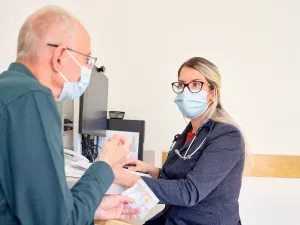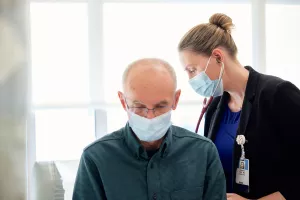Cancer treatments can affect your heart, especially if you have heart problems or are at risk. No matter where you are in your cancer journey, our team of heart and cancer experts works together to balance treatments and protect your heart from damage and disease.
Protect your heart with cardio-oncology care during cancer treatment
Cancer can put a lot of stress on your heart. Some treatments like chemotherapy and radiation can raise your risk of heart disease. When these treatments harm your heart, it’s called cardiac toxicity.
Balancing cancer treatment with heart protection can be tricky, but you don’t have to do it alone. Our cardio-oncology team helps by screening you for heart disease risks early on. We work closely with your cancer care team to create personalized plans that reduce these risks and support your heart health during cancer treatment and recovery.

Conditions
If you're already at risk of heart problems, cancer treatment could make that risk even higher. Your heart health may be affected by:
- The type of cancer you have
- The strain cancer puts on your heart
- The cancer treatment used
Cancer treatment can lead to heart conditions, including:
- Heart failure or cardiomyopathy caused by chemotherapy drugs
- High blood pressure (hypertension) caused by drugs like tyrosine kinase inhibitors
- Early coronary artery disease and heart valve disease caused by chest radiation
Testing
If your cancer treatment includes chemotherapy or surgery, we’ll schedule a cardiology risk assessment for you. During this appointment, we’ll check if you’re at risk for heart problems and recommend ways to protect your heart.
Our cardio-oncologists will use several tests for your assessment, including:
- Cardiac catheterization: A catheter is guided to your heart to check for damage or infection.
- Echocardiogram: An ultrasound to view your heart's structure and function.
- Exercise “stress” echocardiogram: Monitors how your heart responds to exercise.
- Vascular ultrasound: Checks blood flow in your vessels.
Your heart health is our top priority. Depending on your needs, we may suggest follow-up tests for a clearer picture of your heart health. This helps us create a personalized plan to prevent heart damage from cancer treatment with support from our cardio-oncology team.
Treatments
Cancer treatments can affect your heart in different ways and at different times. Our cardio-oncology team offers treatments, resources and support to keep your heart healthy — whether you’ve just been diagnosed, are currently undergoing treatment or are in remission. Wherever you are in your cancer care, our expert cardiovascular oncology team will ensure your heart health is a priority too.
If you have heart disease before your cancer treatment, we’ll closely monitor your heart throughout your care. Your cardio-oncology plan may include regular appointments and ongoing testing to manage symptoms and prevent your condition from worsening.
If you develop heart problems during treatment, we’ll create a personalized plan to address them. This might include adding medications or interventions to help improve your heart function.
As you move into the post-treatment phase of your life, we’ll work with the Survivorship Program to keep track of your heart health. At the first sign of any heart stress, we’ll be ready to create a plan to address it.

From regular office visits to inpatient stays, find the healthcare you need and deserve close to home.

Meet the doctors and care team devoted to supporting you every step of the way along your path to better health.